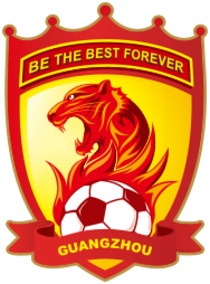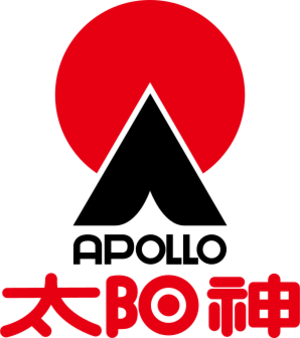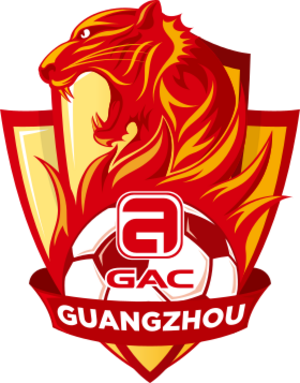Guangzhou F.C. facts for kids
 |
|||
| Full name | Guangzhou Football Club | ||
|---|---|---|---|
| Nickname(s) | South China Tigers (华南虎) | ||
| Founded | June 1954 | ||
| Dissolved | 6 January 2025 | ||
| Ground | Huadu Stadium | ||
| Capacity | 13,394 | ||
|
|
|||
| Guangzhou F.C. | |||||||||||||
|---|---|---|---|---|---|---|---|---|---|---|---|---|---|
| Traditional Chinese | 廣州足球俱樂部 | ||||||||||||
| Simplified Chinese | 广州足球俱乐部 | ||||||||||||
| Jyutping | Gwong2 zau1 zuk1 kau4 keoi1 lok6 bou6 | ||||||||||||
| Cantonese Yale | Gwóngjāu zūk kaù lokh bouh | ||||||||||||
| Hanyu Pinyin | Guǎngzhōu Zúqiú Jùlèbù | ||||||||||||
|
|||||||||||||
Guangzhou Football Club (simplified Chinese: 广州足球俱乐部; traditional Chinese: 廣州足球俱樂部; pinyin: Guǎngzhōu Zúqiú Jùlèbù), also known as Guangzhou Evergrande for many years, was a professional football team from Guangzhou, Guangdong, China. The club played its home games at different stadiums in Guangzhou, including Tianhe Stadium and Yuexiushan Stadium. Most recently, they played at Huadu Stadium.
The club was started in 1954. It won several titles in China's second-tier league before becoming a professional team in 1993. They improved quickly, even finishing second in China's top league. After a period of ups and downs, the club won the second division again in 2007.
In 2009, the club faced problems related to unfair play and was moved down to a lower league. In 2010, a company called Evergrande Real Estate Group bought the club. They invested a lot of money, and the team quickly won promotion back to the top league. They then won their first top-tier title in 2011.
Guangzhou FC became the most successful Chinese football club in Asian competitions. They won the AFC Champions League twice, in 2013 and 2015. This allowed them to play in the FIFA Club World Cup in those years. Between 2011 and 2017, Guangzhou won the Chinese Super League title seven times in a row. They won another Super League title in 2019.
However, due to financial difficulties, the club was moved down from the top league after the 2022 season. The club was officially dissolved in January 2025 because it could not pay its large debts. In 2016, Forbes magazine reported that the team was worth about US$282 million, making it the most valuable Chinese football team at the time.
Contents
Club History
Early Years
In June 1954, the city of Guangzhou started the Guangzhou Football Team. They joined the new Chinese national football league in 1955. Their first manager was Luo Dizhi. The team finished eighth in their first season, which meant they moved down to the second division.
Guangzhou won the second division championship in 1956. However, the league changed its rules, and they were not allowed to move up. They won the second division again in 1958 but still could not get promoted. The team was restarted in April 1961 and played in the top league. They often struggled and were moved down again in 1963. Football in China then stopped for a while during the Cultural Revolution.
Promotions and Sponsorship
When Chinese football restarted, Guangzhou focused on its youth team. In 1977, Luo Rongman became the manager of their youth players. These young players, like Mai Chao and Zhao Dayu, grew up to become famous Chinese international footballers.
The team started in the third division in 1980 and quickly moved up through the leagues. They reached the top division again in 1984. Guangzhou also became the first Chinese team to get a sponsor. The Guangzhou Baiyunshan Pharmaceutical Factory signed a deal to support the club.
Becoming Professional and Challenges
In the 1990s, Chinese football teams were asked to become more professional. Guangzhou was one of the first to do so when the Apollo Group took over in 1993. This investment helped the team become very competitive. They finished second in the league in 1994.
After their manager, Zhou Sui'an, left, the team struggled. When important players also left, the team was moved down from the top league in 1998. An investigation found that some players were involved with gambling groups and were removed from the club.
In 2001, the Guangzhou Sports Bureau took over the club again. New sponsors, Zhejiang Geely Holding Group, invested money. However, a match-fixing problem in the league caused Geely to stop their funding. The club went through a difficult time until the Sunray Cave Group took over in 2004. In 2006, the Guangzhou Pharmaceuticals group took charge, and the club finally won the second division title in 2007, moving up to the Chinese Super League.
In February 2010, Guangzhou was moved down to a lower league again. This was because of a past match from 2006 where the club's general manager had paid money to win a game. The people involved were sent to jail.
On February 28, 2010, the Evergrande Real Estate Group bought the club. The chairman, Xu Jiayin, promised to invest a lot of money. They signed famous players like Gao Lin, Sun Xiang, Zheng Zhi, and Brazilian player Muriqui. On October 30, 2010, Guangzhou won the League One championship and returned to the Super League.
Years of Success
In 2011, Guangzhou Evergrande bought more strong players, including Argentinean Dario Conca and Brazilian Cléo. Even though they had just been promoted, they won the Super League title in September 2011 with games still left to play.
In March 2012, Guangzhou played and won their first-ever AFC Champions League match. They beat South Korean champions Jeonbuk Hyundai Motors 5-1. They also signed Paraguayan player Lucas Barrios and brought in famous Italian coach Marcello Lippi. Guangzhou reached the quarter-finals of the 2012 AFC Champions League. In 2012, they won the Super League for the second time in a row and also won the Chinese FA Cup.
In 2013, Guangzhou Evergrande signed Chinese goalkeeper Zeng Cheng and Brazilian player Elkeson. This helped them win the Super League for the third time in a row. The club also won the 2013 AFC Champions League by beating FC Seoul. This was the first time a Chinese team had won the tournament since 1990.
Winning the AFC Champions League meant Guangzhou played in the 2013 FIFA Club World Cup. They beat the African champions Al-Ahly 2-0. In the semi-finals, they lost to European champions Bayern Munich. They finished fourth in the tournament.
Guangzhou continued their success, winning the Chinese Super League titles in 2014 and 2015. On November 21, 2015, they won their second AFC Champions League title. They also played in the 2015 FIFA Club World Cup, beating Club América before losing to Barcelona. They finished fourth again. By 2020, Guangzhou Evergrande had won eight Super League championships in total, including seven in a row from 2011 to 2017.
Financial Problems and End of the Club
Before the 2021 season, the team's name was changed to Guangzhou FC. This was because the Chinese Football Association wanted clubs to have "neutral" names, without company names in them. In the same year, the Evergrande Group, which owned the club, faced big financial problems. This led to the club's financial collapse.
After losing several key players, the team was moved down from the Super League in 2022. This ended their twelve-season stay in the top league. In January 2025, Guangzhou FC was removed from China's professional football leagues because it could not pay its large debts. As a result, the club announced that it was dissolving.
Stadiums
Guangzhou FC played its home games at different stadiums over the years. Before the 2023 season, they moved to Yuexiushan Stadium. This stadium was previously used by another Guangzhou team. Before that, they played at Tianhe Stadium, which could hold 54,856 fans.
In April 2020, work began on a new stadium called Guangzhou Evergrande Football Stadium, planned to hold 100,000 people. It was meant to be ready by December 2022. However, due to the financial problems of the Evergrande Group, the project was stopped in mid-2022. On February 29, 2024, Guangzhou announced a move to the Huadu Stadium.
Ownership and Naming History
| Year | Owner | Club name | Sponsored team name |
|---|---|---|---|
| 1954–55 | Central and Southern China Institute of Sports | Central and Southern China Sports Institute Football Team | Central and Southern China White |
| 1955 | Guangzhou | ||
| 1956 | Central and Southern China White | ||
| 1956–57 | Guangzhou Institute of Sports | Guangzhou Institute of Sports Football Team | |
| 1958 | Guangzhou Football Team | ||
| 1959–61 | Guangzhou Public Security Bureau | Guangzhou Vanguard Football Team | |
| 1962–66 | Guangzhou Sports Bureau | Guangzhou Football Team | |
| 1977–79 | Guangzhou Youth Football Team | ||
| 1980–84 | Guangzhou Football Team | ||
| 1985–89 | Guangzhou Baiyun | ||
| 1989–93 | Guangzhou Football Club | ||
| 1993–2000 | Guangdong Apollo Group | Guangzhou Apollo Football Club | |
| 2001–02 | Guangzhou Sports Bureau | Guangzhou Football Club | Guangzhou Geely |
| 2002–03 | Guangzhou Xiangxue | ||
| 2004–05 | Sunray Cave Group | Guangzhou Sunray Cave | |
| 2006–07 | Guangzhou Pharmaceutical Holdings | Guangzhou GPC Football Club | |
| 2008 | Guangzhou GPC Zhongyi | ||
| 2009 | Guangzhou GPC Baiyunshan | ||
| 2010 | Guangzhou Sports Bureau | Guangzhou Football Club | |
| 2010 | Evergrande Real Estate Group | Guangzhou Evergrande Football Club | Guangzhou GAC |
| 2011–14 | |||
| 2014–15 | Evergrande Real Estate Group (50%→60%) Alibaba Group (50%→40%) |
Guangzhou Evergrande Taobao Football Club | |
| 2016–20 | Evergrande Real Estate Group (56.71%) Alibaba Group (37.81%) Other shareholders in NEEQ (5.48%) |
||
| 2021–25 | Guangzhou Football Club |
Kit Manufacturers
| Period | Kit manufacturer |
|---|---|
| 1994 | Umbro |
| 1995 | Reebok |
| 1996 | Diadora |
| 1997 | Reebok |
| 1998–2005 | Ucan |
| 2006–2007 | Godedke |
| 2008–2023 | Nike |
| 2024 | Kelme |
Rivalries
Guangzhou FC had a local rivalry, often called the Canton derby, with other teams from the city.
When professional football started in China in 1994, another team called Guangzhou Matsunichi was formed. This team used to be Guangzhou FC's youth academy. They even shared the Yuexiushan Stadium. In their first match in 1995, Matsunichi won. The rivalry ended in 2000 when Guangzhou FC beat Matsunichi, which led to Matsunichi being moved down from the league and then dissolving.
Later, when Guangzhou R&F moved to Guangzhou, a new local derby began. The first Canton derby between Guangzhou Evergrande and Guangzhou R&F was on March 16, 2012. Guangzhou Evergrande lost that game 2-0.
Managerial History
Amateur Period (1954–1993)
Professional Period (1994–2024)
| Manager | Period | Honours |
|---|---|---|
| 1994 – 7 June 1995 | ||
| 8 June 1995 – 28 December 1995 | ||
| January 1996 – 15 April 1996 | ||
| 16 April 1996 – December 1996 | ||
| January 1997 – 13 August 1997 | ||
| 13 August 1997 – 12 June 1998 | ||
| 12 June 1998 – 4 May 1999 | ||
| 5 May 1999 – December 1999 | ||
| January 2000 – 19 April 2000 | ||
| 19 April 2000 – 23 September 2000 | ||
| 13 November 2000 – 11 December 2000 | ||
| 11 December 2000 – 25 July 2001 | ||
| 25 July 2001 – 2 September 2002 | ||
| 2 September 2002 – 19 December 2002 | ||
| 19 December 2002 – 18 February 2003 | ||
| 18 February 2003 – 31 October 2005 | ||
| 25 November 2005 – 25 February 2006 | ||
| 25 February 2006 – 31 December 2006 | ||
| 4 January 2007 – 30 November 2009 | 2007 China League One | |
| 1 December 2009 – 25 March 2010 | ||
| 25 March 2010 – 16 May 2012 | 2010 China League One 2011 Chinese Super League 2012 Chinese FA Super Cup |
|
| 17 May 2012 – 2 November 2014 | 2012 Chinese Super League 2012 Chinese FA Cup 2013 Chinese Super League 2013 AFC Champions League 2014 Chinese Super League |
|
| 5 November 2014 – 4 June 2015 | ||
| 4 June 2015 – 5 November 2017 | 2015 Chinese Super League 2015 AFC Champions League 2016 Chinese FA Super Cup 2016 Chinese Super League 2016 Chinese FA Cup 2017 Chinese FA Super Cup 2017 Chinese Super League |
|
| 9 November 2017 – 28 September 2021 | 2018 Chinese FA Super Cup 2019 Chinese Super League |
|
| 7 December 2021 – January 2022 | ||
| 4 May 2022 – 14 August 2022 | ||
| 14 August 2022 – 30 March 2023 | ||
| 30 March 2023 – 5 June 2023 | ||
| 6 June 2023 – 25 December 2024 |
Honours
Guangzhou FC won many titles during its history, both as a professional and semi-professional club.
Domestic Titles
League Championships
- Chinese Jia-A League (top division until 2003)
- Runners-up (2): 1992, 1994
- Chinese Super League (top division since 2004)
- Winners (8): 2011, 2012, 2013, 2014, 2015, 2016, 2017, 2019
- Runners-up (2): 2018, 2020
- Chinese Second Division / Jia-B League (second division until 2003)
- Winners (3): 1956, 1958, 1981
- Runners-up (2): 1983, 1990
- China League One (second division since 2004)
- Winners (2): 2007, 2010
Cup Competitions
- Chinese FA Cup
- Winners (2): 2012, 2016
- Runners-up (2): 1991, 2013
- Chinese FA Super Cup
- Winners (4): 2012, 2016, 2017, 2018
- Runners-up (3): 2013, 2014, 2015
International Titles
- AFC Champions League
- Winners (2): 2013, 2015
- FIFA Club World Cup
- Fourth place (2): 2013, 2015
International Players
Many players who played for Guangzhou FC also represented their home countries in international football. Players whose names are in bold played for their national teams while they were with Guangzhou.
|
|
|
See also
 In Spanish: Guangzhou Football Club para niños
In Spanish: Guangzhou Football Club para niños
 | Claudette Colvin |
 | Myrlie Evers-Williams |
 | Alberta Odell Jones |



